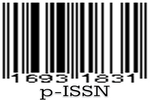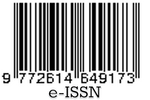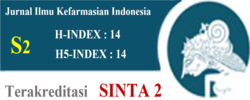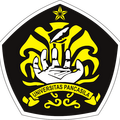Evaluation of Adverse Effects in Patient with Breast Cancer Chemotherapy at A Hospital in Bandung
Abstract
Chemotherapy is one of the breast cancer treatments. However, there are several adverse effects with mild to high severity related to this treatment. This study was made to evaluate adverse effects which occurred in breast cancer patients who are still in their chemotherapy cycle. The evaluation consists of assessment of adverse effects associated with chemotherapy regimens and its dosage, causality assessment, and preventability assessment. This study was done from December 2012 until March 2013 concurrently. The data was collected directly from the patients by doing the interview. The data was also collected from the patient’s medical record and nurse’s daily documentation. Clinically, FAC caused more adverse effects than other chemotherapy regimens. However, in the 6% of excess dosage, there were no different acute adverse effects. The most occurred adverse effect was alopecia with 81% percentage. Causality assessment with probability scale Naranjo and WHO criteria showed that 97.3% and 99.2% were ‘probable’. The preventability assessment which based on Thornton- Schumock criteria showed that only nausea and vomit which were ‘definitely preventable’.
References
2. Mallik S, Palaian S, Ojha P dan Mishra P. Pattern of adverse drug reactions due to cancer chemotherapy in a tertiary care teaching hospital in Nepal. Pak J Pharm Sci. 2007. 20(3):214-18.
3. Poddar S, Sultana1 R, Sultana R, Mohammad M, Azad MAK, Hasnat A. Pattern of adverse drug reactions due to cancer chemotherapy in tertiary care teaching Hospital in Bangladesh. Dhaka Univ J Pharm Sci. 2009.8(1):11-16.
4. Dipiro JT, Talbert RL, Yee GC, Matkze GR, Wells BG, dan Posey LM. Pharmacotherapy: a patophysiologic approach. 7th Ed. New York: The McGrow Hill Companies; 2008. 2121.
5. McCance KL, Huether SE. The biologic basis for disease in adults and children. Mosby: Missouri; 2002. 762-72.
6. Martin M, Villar A, Sole-Calvo A, Gonzalez R, Massuti B, Lizon J, et al. Doxorubicin in combination with fluorouracil and cyclophosphamide (i.v. FAC regimen, day 1, 21) versus methotrexate in combination with fluorouracil and cyclophosphamide (i.v. CMF regimen, day 1, 21) as adjuvant chemotherapy for operable breast cancer: a study by the GEICAM group. Annals of Oncology. 2003.14:833–42.
7. Solimando DA. Drug information handbook for oncology. Lexi-Comp: Ohio; 2004.
8. Gonzalez-Angulo AM, Hortobagyi GN, Esteva FJ. Adjuvant therapy with trastuzumab for HER-2/ neu-positive breast cancer. The Oncologist. 2006. 11:857–67.
9. Jenkins P, Wallis R. Dose-rounding of adjuvant chemotherapy for breast cancer: an audit of toxicity. J Oncol Pharm Pract. 2010. 16:251-55.
10. Hesketh PJ. Review article chemotherapy-induced nausea and vomiting. N Engl J Med. 2008. 358:2482-94.
11. Payne AS, James WD, Weiss RB. Dermatologic toxicity of chemotherapeutic agents. Semin Oncol. 2006. 33: 86-97.
12. Poppe LM, Bröcker EB, Trautmann A. The one-nail brown band: macro- and micro-morphology. Acta Derm Venereol. 2013. 93:1-2.
13. Skelley K. Prevention and treatment of stomatitis & mucositis in patient receiving chemotherapy. Royal United Hospital Bath NHS Trust. 2005. 1-12.
14. Stein A, Voigt W dan Jordan K. Chemotherapy-induced diarrhea: pathophysiology, frequency and guideline- based management. Ther Adv Med Oncol. 2010. 2(1):51-63.
15. Avila JG. Pharmacologic treatment of constipation in cancer patients. The Department of Pharmacy, H. Lee Moffitt Cancer Center & Research Institute. 2004. 11(3).Suppl 1:10-18.
16. Raut AL, Patel P, Patel C, Pawar A. Preventability, predictability and seriousness of adverse drug reactions amongst medicine inpatients in a teaching hospital: a prospective observational study. International Journal Of Pharmaceutical and Chemical Sciences. 2012.
1(3):944-50.
17. Schafer AI. Current concepts thrombocytosis. N Engl J Med. 2004.350(12):1211-19. 18. Bambace NM, Holmes CE. The platelet contribution to cancer progression. J Thromb Haemost. 2011. 9:237–49.
Licencing
All articles in Jurnal Ilmu Kefarmasian Indonesia are an open-access article, distributed under the terms of the Creative Commons Attribution-NonCommercial-ShareAlike 4.0 International License which permits unrestricted non-commercial used, distribution and reproduction in any medium.
This licence applies to Author(s) and Public Reader means that the users mays :
- SHARE:
copy and redistribute the article in any medium or format - ADAPT:
remix, transform, and build upon the article (eg.: to produce a new research work and, possibly, a new publication) - ALIKE:
If you remix, transform, or build upon the article, you must distribute your contributions under the same license as the original. - NO ADDITIONAL RESTRICTIONS:
You may not apply legal terms or technological measures that legally restrict others from doing anything the license permits.
It does however mean that when you use it you must:
- ATTRIBUTION: You must give appropriate credit to both the Author(s) and the journal, provide a link to the license, and indicate if changes were made. You may do so in any reasonable manner, but not in any way that suggests the licensor endorses you or your use.
You may not:
- NONCOMMERCIAL: You may not use the article for commercial purposes.
This work is licensed under a Creative Commons Attribution-NonCommercial-ShareAlike 4.0 International License.





 Tools
Tools





















